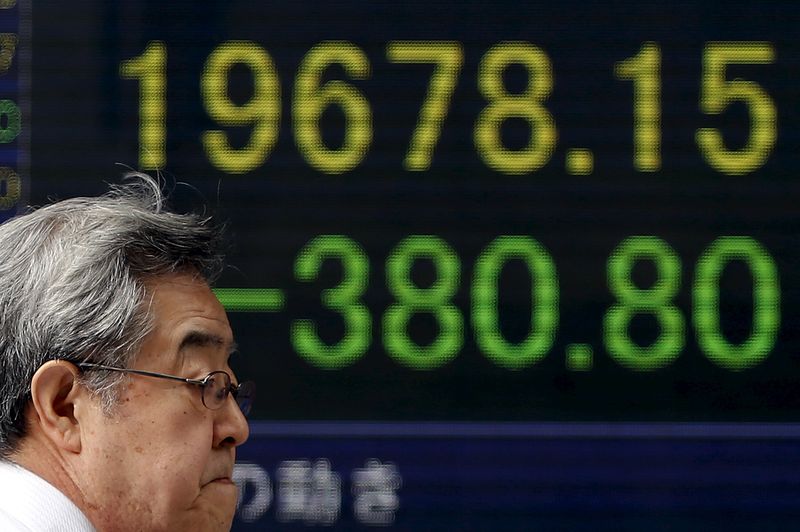Investing.com - Share markets across the Asian-Pacific tanked at Monday's open, following the declines in US markets driven by a weaker-than-expected July jobs report and disappointing corporate earnings.
The S&P/ASX 200 shed 2.6%, KOSPI 200 lost 3.6%, and Nikkei 225 each shed over 5% in the first 45 minutes of trade,
In the US, stocks fell as the July jobs report indicated a weakening economy, while major companies delivered lackluster earnings results. The Dow Jones Industrial Average dropped 1.5% to 39,737, bringing its weekly decline to 2.1%. The NASDAQ Composite fell 2.4% for the day and 3.4% for the week, closing at 16,776. The S&P 500 lost 1.8% for the day and 2.1% for the week, ending at 5,347.
Intel Corporation (NASDAQ:INTC) shares plunged 26% after announcing plans to lay off over 15,000 employees. Insurer Prudential Financial Inc (NYSE:PRU) dropped 10% after missing earnings expectations. The Russell 2000 index, which tracks smaller companies, fell 3.5% on Friday and 6.7% for the week, closing at 2,109.
The US economy's employment growth slowed significantly in July, and the unemployment rate rose to 4.3%, the highest since 2021. These developments heightened concerns that the Federal Reserve might have to cut interest rates more aggressively than initially anticipated. Markets are now betting on a deeper rate cut, with futures showing over a 70% likelihood of a half-point cut in September.
Ten-year Treasury yields fell to 3.795%, the lowest finish this year, with a significant 0.4 percentage point drop over the week—the most substantial move since March 2020.
Among commodities, Brent crude oil fell 3.4% to $76.81 per barrel, while gold dipped 0.1% to $2,443.24.
Chinese shares followed Wall Street's lead, closing lower due to the lack of new stimulus from Chinese authorities. The Shanghai Composite Index declined 0.9% to 2,905.34, the Shenzhen Composite Index fell 1.3%, and the ChiNext Price Index dropped 1.7%. Losses were led by auto and energy stocks such as Ningbo Tuopu and BYD, which fell 4.4% and 3.9%, respectively. In contrast, Hangzhou Tigermed Consulting gained 4.6%.
Hong Kong’s Hang Seng Index closed 2.1% lower at 16,945.51, with broad losses in consumer stocks. Significant decliners included Wharf REIC (-4.9%), Meituan (-4.8%), and Galaxy Entertainment (-4.6%). WuXi AppTec gained 4.75%, Budweiser Brewing rose 2.9%, and China Unicom added 1.5%. The Hang Seng Tech Index closed 2.6% lower.
Japan's Nikkei Stock Average dropped 5.8% to 35,909.70, its largest percentage drop since March 2020, driven by a stronger yen and signs of a cooling US economy. Tokyo Electron fell 12%, and Daiwa Securities Group dropped 19%. The 10-year Japanese government bond yield fell 7.5 basis points to 0.955%.
India's Sensex ended 1.1% lower at 80,981.95, influenced by global sell-offs and weaker US economic data. Steel and tech stocks led the declines, with Tata Steel (-3.0%) and JSW Steel (-3.9%). Infosys fell 1.7%, and HCL Technologies dropped 1.8%. Gains included HDFC Bank (+1.2%) and Sun Pharmaceutical Industries (+0.95%).
UK stocks also fell, with the FTSE 100 Index down 1.3% to 8,174.71. Carnival (NYSE:CCL) PLC posted the largest decline (-8.5%), followed by Oxford Nanopore Technologies PLC (-8.0%) and CMC Markets PLC (-7.4%). On the upside, International Consolidated Airlines Group (LON:ICAG) S.A. gained 4.7%, Haleon PLC rose 2.7%, and United Utilities Group PLC increased by 2.5%.
Across Europe, markets closed lower. The STOXX Europe 600 Index fell 2.7% to 497.85, Germany’s DAX dropped 2.3% to 17,661.22, and France’s CAC 40 declined 1.6% to 7,251.80.
